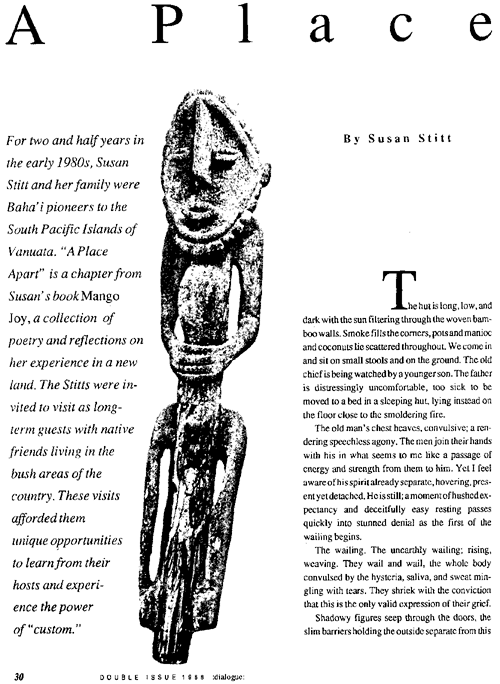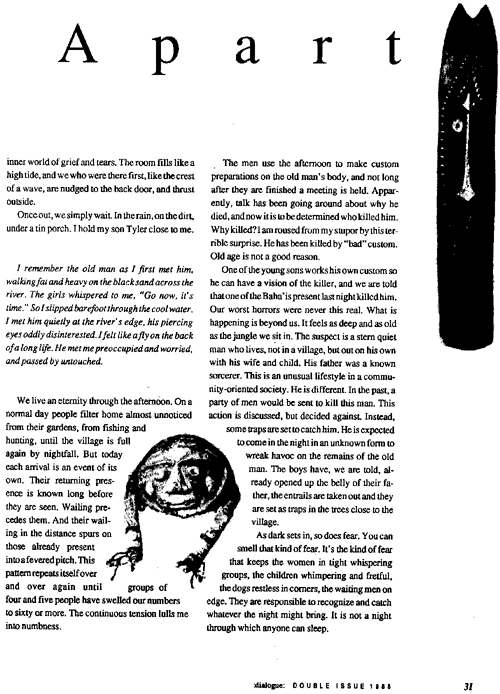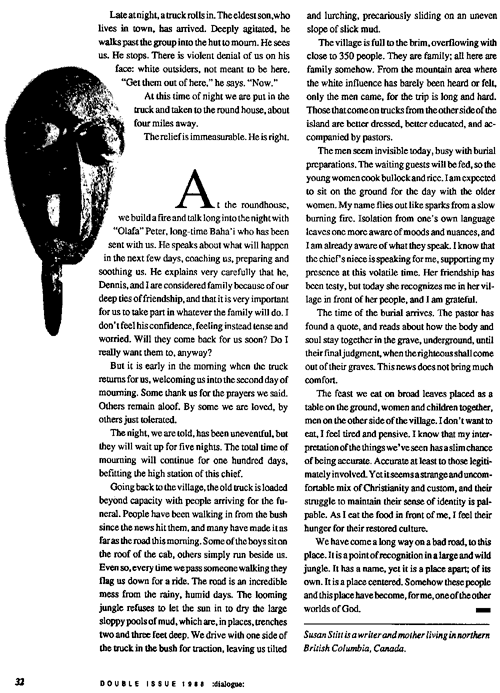
|
|
Abstract: A chapter from Mango Joy, a book of poetry and reflections about pioneering in Vanuata and the culture of the South Pacific. Notes: See also list of dialogue articles or image scans. |
For two and a half years in the early 1980s, Susan Stitt and her family were Bahá'í pioneers to the South Pacific Islands of Vanuatu. “A Place Apart” is a chapter from Susan’s book Mango Joy, a collection of poetry and reflections on her experience in a new land. The Stitts were invited to visit as long-term guests with native friends living in the bush areas of the country. These visits afforded them unique opportunities to learn from their hosts and experience the power of “custom.”
The old man’s chest heaves, convulsive; a rendering speechless agony. The men join their hands with his in what seems to me like a passage of energy and strength from them to him. Yet I feel aware of his spirit already separate, hovering, present yet detached. He is still; a moment of hushed expectancy and deceitfully easy resting passes quickly into stunned denial as the first of the wailing begins.
The waiting. The unearthly waiting; rising, weaving. They wail and wail, the whole body convulsed by the hysteria, saliva, and sweat mingling with tears. They shriek with the conviction that this is the only valid expression of their grief.
Shadowy figures seep through the doors, the slim barriers holding the outside separate from this inner world of grief and tears. The room fills like a high tide, and we who were there first, like the crest of a wave, are nudged to the back door, and thrust outside.
Once out, we simply wait. In the rain, on the dirt, under a tin porch. I hold my son Tyler close to me.
I remember the old man as I first met him, walking fat and heavy on the black sand across the river. The girls whispered to me, “Go now, it’s time.” So I slipped barefoot through the cool water. I met him quietly at the river’s edge, his piercing eyes oddly disinterested. I felt like a fly on the back of a long life. He met me preoccupied and worried, and passed by untouched.
We live an eternity through the afternoon. On a normal day people filter home almost unnoticed from their gardens, from fishing and hunting, until the village is full again by nightfall. But today each arrival is an event of its own. Their returning presence is known long before they are seen. Wailing precedes them. And their wailing in the distance spurs on those already present into a fevered pitch. This pattern repeats itself over and over again until groups of four and five people have swelled our numbers to sixty or more. The continuous tension lulls me into numbness.
The men use the afternoon to make custom preparations on the old man’s body, and not long after they are finished a meeting is held. Apparently, talk has been going around about why he died, and now it is to be determined who killed him. Why killed? I am roused from my stupor by this terrible surprise. He has been killed by “bad” custom. Old age is not a good reason.
One of the young sons works his own custom so he can have a vision of the killer, and we are told that one of the Bahá'ís present last night killed him. Our worst horrors were never this real. What is happening is beyond us. It feels as deep and as old as the jungle we sit in. The suspect is a stern quiet man who lives, not in a village, but on his own with his wife and child. His father was a known sorcerer. This is an unusual lifestyle in a community-oriented society. He is different. In the past, a party of men would be sent to kill this man. This action is discussed, but decided against. Instead, some traps are set to catch him. He is expected to come in the night in an unknown form to wreak havoc on the remains of the old man. The boys have, we are told, already opened up the belly of their father, the entails are taken out and they are set as traps in the trees close to the village.
As dark sets in, so does fear. You can smell that kind of fear. It’s the kind of fear that keeps the women in tight whispering groups, the children whimpering and fretful, the dogs restless in corners, the waiting men on edge. They are responsible to recognize and catch whatever the night might bring. It is not a night through which anyone can sleep.
Late at night, a truck rolls in. The eldest son, who lives in town, has arrived. Deeply agitated, he walks past the group into the hut to mourn. He sees us. He stops. There is violent denial of us on his face: white outsiders, not meant to be here. “Get them out of here,” he says. “Now.”
At this time of night we are put in the truck and taken to the round house, about four miles away.
The relief is immeasurable. He is right.
At the roundhouse, we build a fire and talk long into the night with “Olafa” Peter, long-time Bahá'í who has been sent with us. He speaks about what will happen in the next few days, coaching us, preparing and soothing us. He explains very carefully that he, Dennis and I are considered family because of our deep ties of friendship, and that it is very important for us to take part in whatever the family will do. I don’t feel his confidence, feeling instead tense and worried. Will they come back for us soon? Do I really want them to, anyway?
But it is early in the morning when the truck returns for us, welcoming us into the second day of mourning. Some thank us for the prayers we said. Others remain aloof. By some we are loved, by others just tolerated.
The night, we are told, has been uneventful, but they will wait up for five nights. The total time of mourning will continue for one hundred days, befitting the high station of this chief.
Going back to the village, the old truck is loaded beyond capacity with people arriving for the funeral. People have been walking in from the bush since the news hit them, and many have made it as far as the road this morning. Some of the boys sit on the roof of the cab, others simply run beside us. Even so, every time we pass someone walking they flag us down for a ride. The road is an incredible mess from the rainy, humid days. The looming jungle refuses to let the sun in to dry the large sloppy pools of mud, which are, in places, trenches two and three feet deep. We drive with one side of the truck in the bush for traction, leaving us tilted and lurching, precariously sliding on an uneven slope of slick mud.
The village is full to the brim, overflowing with close to 350 people. They are family; all here are family somehow. From the mountain area where the white influence has barely been heard or felt, only the men came, for the trip is long and hard. Those that come on trucks from the other side of the island are better dressed, better educated, and accompanied by pastors.
The men seem invisible today, busy with burial preparations. The waiting guests will be fed, so the young women cook bullock and rice. I am expected to sit on the ground for the day with the older women. My name flies out like sparks from a slow burning fire. Isolation from one’s own language leaves one more aware of moods and nuances, and I am already aware of what they speak. I know that the chief’s niece is speaking for me, supporting my presence at this volatile time. Her friendship has been testy, but today she recognizes me in her village in front of her people, and I am grateful.
The time of the burial arrives. The pastor has found a quote, and reads about how the body and soul stay together in the grave, underground, until their final judgment, when the righteous shall come out of their graves. This news does not bring much comfort.
The feast we eat on broad leaves placed as a table on the ground, women and children together, men on the other side of the village. I don’t want to eat, I feel tired and pensive. I know that my interpretation of the things we’ve seen has a slim chance of being accurate. Accurate at least to those legitimately involved. Yet it seems a strange and uncomfortable mix of Christianity and custom, and their struggle to maintain their sense of identity is palpable. As I eat the food in front of me, I feel their hunger for their restored culture.
We have come a long way on a bad road, to this place. It is a point of recognition in a large and wild jungle. It has a name, yet it is a place apart; of its own. It is a place centered. Somehow these people and this place have become, for me, one of the other worlds of God.
Susan Stitt is a writer and mother living in northern British Columbia, Canada.
 click for larger image |
 click for larger image |
 click for larger image |
|
|